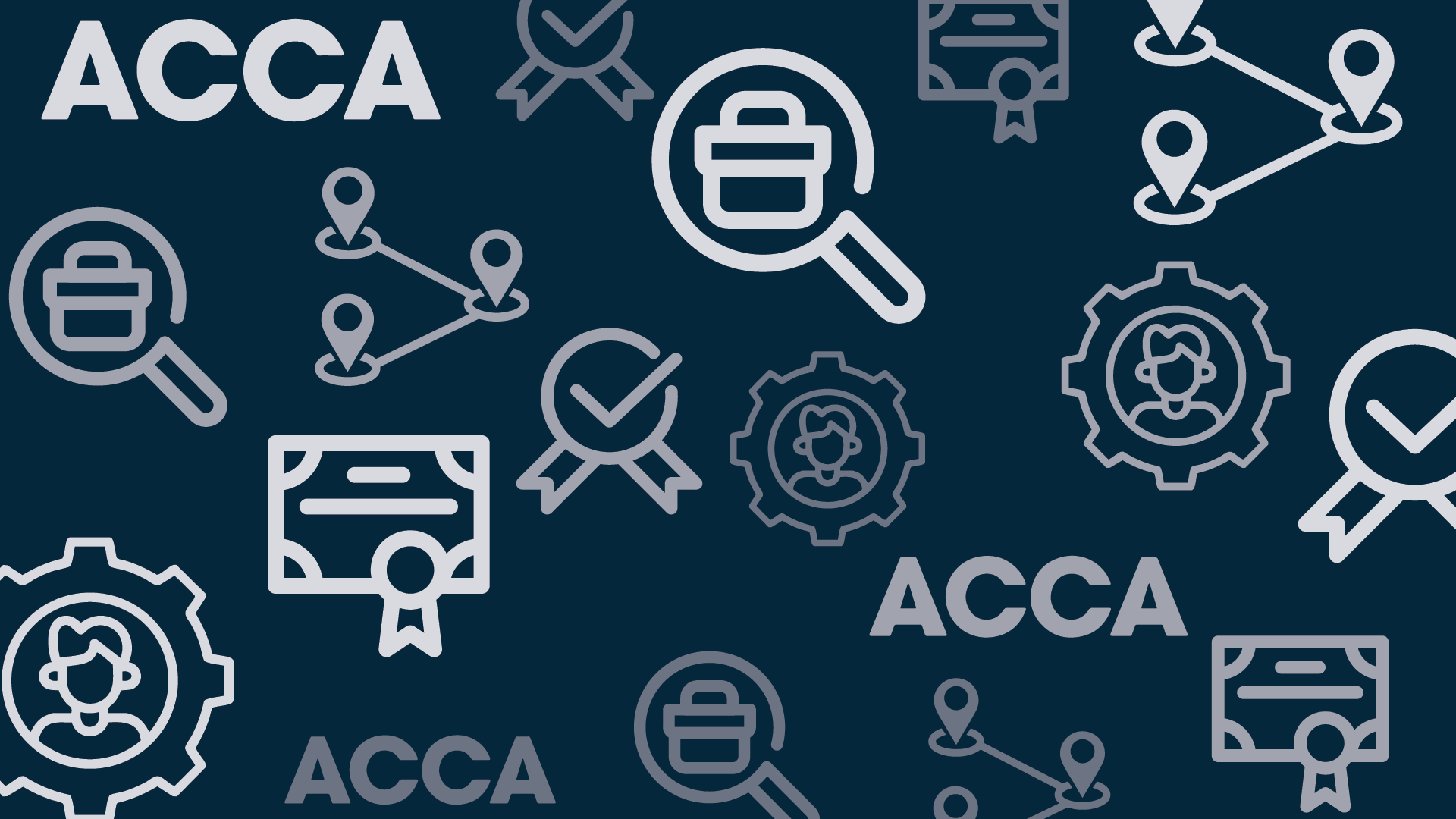ACCA is one of the most prestigious and recognised finance qualifications out there (amongst others such as CIMA and ACA). If you're pursuing, studying, or newly graduated, you may be wondering what comes next.
If you’re considering moving up the career ladder, you’d be in a great position as the qualification is highly sought after in the finance market. The broad skill set you gain opens doors to various pathways and specialisations. Here we explore potential routes and specialisations you could pursue.
Route 1 - move into industry
Moving from practice to industry allows you to utilise your skills in a different environment where you can focus on the specific needs and financial requirements of your organisation and even be part of the decision-making process. There is always a need for accountants, and you’ll be able to choose an industry and organisation that suits your interests and career goals.
Here are just some of the jobs you could expect to get with your ACCA qualification:
Management Accountant
Financial Accountant
Corporate Treasurer
Fund Accountant
Forensic Accountant
Auditor
Tax Specialist
As you progress, you’ll be able to move into one of the following roles:
Financial Controller
Finance Manager
Finance Director
Chief Financial Officer (CFO)
Route 2 - stay in the same role
Firstly, staying in your current position at the same practice with the qualification allows for rapid progression within the company. Your valuable skills and qualifications make you an asset, leading to increased responsibilities and higher-level roles. This progression includes salary increases, and as a qualified finance professional, your sought-after status enables negotiation for competitive compensation with other potential employers.
Route 3 - join an accounting firm/stay in practice
You could leverage the skills you’ve learned across a broad range of businesses and find the best progression through an accountancy firm, where you can also enjoy client interaction and the diversity of work. Opting for a career in an accountancy firm offers a fulfilling path, enabling you to devise optimal solutions for clients spanning various industries. You can specialise in services such as tax or management consulting. Notably, prestigious firms like the Big 4 provide opportunities to start as a junior and progress to senior or executive positions.
Route 4 - move to a competitor
Possessing a qualification enhances your appeal to other companies. Joining a competitor can offer exposure to sizable clients, fresh work settings, different partners, and managers. Transitioning from a larger firm, you might seek opportunities in smaller practices offering direct paths to partnership and closer collaboration with teams and clients.
Alternatively, consider transitioning to a different practice or a more expansive role, providing exposure to new procedures, environments, and opportunities to establish connections with new clients. The choice depends on personal preferences and your desired career path.
Specialisations
With a qualification, you’ll be able to specialise in a certain field of finance or accounting. Here are the different areas you could specialise in, the skills needed and the corresponding career progression available:
Internal audit
You could choose project-based roles that offer visibility within your team and opportunities to develop key relationships across your organisation. Coming from a practice background, internal audit serves as an ideal avenue to transition skills into industry settings, potentially leading to executive roles like C-suite or Chief Audit Executive positions.
You’ll oversee the auditing process of financial statements, ensuring compliance with regulatory standards and identifying areas of improvement, while also mitigating risks and enhancing organisational performance.
Progression in internal audit could lead to Senior Internal Auditor roles, where you supervise teams and spearhead audit projects. Within larger audit departments, advancement to managerial positions involves directing departmental activities, overseeing performance, and communicating audit outcomes to relevant stakeholders.
Key skills needed: financial acumen, accounting principles and budgeting processes, risk assessment, data analysis, regulatory knowledge, and a strong understanding of financial statements.
Management Accounting
Going down the management accounting route can help you gain various skills in accounting, management techniques, business strategy and commercial decision-making processes.
You'll assume responsibility for assessing the financial impact of decisions, directly contributing to your business's growth and profitability. Collaborating closely with the managerial team, you will be responsible for measuring the performance of the organisational internal controls and strategies, predominantly analysing the information, and providing insight for better decision-making.
With experience, a position as a management accountant can lead to senior management, finance director or chief executive roles. It would also help you get into any role within private accounting. Ultimately, it serves as an excellent starting point leading to broader career opportunities.
Key skills needed: problem-solving, attention to detail, business strategy, communication skills and analytical and numerical skills.
Finance Manager
If you’re looking for more responsibility or a managerial/operational position, the position of finance manager might suit you. This role involves overseeing the financial well-being of the company and managing its financial operations.
You would perform data analysis and advise senior managers on profit-maximising ideas and highlight opportunities for efficiency to board-level stakeholders. Budget planning, producing reports, developing business plans, and looking for ways to strengthen and improve the current financial process would form part of your day-to-day. Your main duty would be to provide strategic direction and guidance to increase profit and reduce risk.
A manager would likely oversee a team, supporting management with reports and sights. With this experience and the relevant skills gained, this path could lead you to a director position and eventually an executive role e.g. CFO within 5 -10 years. You could also go down the controller route (next specialisation).
Key skills needed: analytical abilities, problem-solving ability, business acumen, numeracy/accounting knowledge, leadership, and communication skills, alongside a thorough understanding of financial software.
Finance Controller
Slightly different but in a similar vein would be Finance Controller. A Finance manager oversees investments, expenses, cash flow, and contract negotiations, whereas a controller manages the day-to-day financial operations of a business.
Although you’d be doing similar tasks such as financial reporting, budget preparations and forecasting, and working with auditors, you'd also oversee adherence to relevant laws and regulations, manage accounting procedures and documentation, and collaborate closely with executive teams.
Within larger organisations, a finance controller assumes a strategic position, collaborating extensively with the executive team to chart the organisation's future trajectory toward achieving financial objectives. In smaller organisations, the role resembles that of a manager, entailing responsibilities for ensuring compliance, enforcing company policies, and overseeing timely and accurate monthly and quarterly closings. In this role, you’d ensure financial stability, implement financial controls and drive business growth.
If you’re starting in a smaller organisation, your next step would be to move to a larger organisation or a different industry. You could also seek a role as group finance director or move to operational finance. With enough experience, you could also become a CFO in the future.
Key skillsneeded: strong analytical abilities, excellent accounting knowledge, leadership and communication skills, and strong financial software understanding.
Group accounting
This position is vital to an organisation’s finance department, especially for larger and more complex companies. This is a rather complicated role so it would require a little more experience. As a group accountant, your primary objective involves delivering precise, timely, and pertinent statutory reports and management data, facilitating management in meeting requisites and meeting strategic business objectives.
You would be producing financial statements for a group of accounts within the same company, supporting profit, sustainability, and overall business performance. Your key tasks would revolve around your organisation’s staying compliant with the right accounting procedures, consolidating financial statements, and providing financial information to help decision-making processes.
This role comes with increased responsibility and a need for strong stakeholder management as you would be communicating directly with the board. This is a great role to FastTrack you to CFO via finance manager if that’s what you’re after. You’d be managing the board and managing a team in commerce soon enough and climbing the ranks to CFO if you so desired.
Key skills needed: technical accounting, financial reporting (as per IFRS standards), consolidation abilities, numerical skills, analytical skills, Excel skills, and computer programming. problem-solving, and strong knowledge of financial statements.
Other options:
Investment Banking – Advise clients on investments, mergers, acquisitions, and raising capital in financial markets.
Financial Planning & Analysis (FP&A) – analysing financial data to support strategic planning, budgeting, forecasting, and decision-making.
Business/Commercial/Data Analysis – understanding, interpreting, translating, and tracking to meet specific business requirements. Your purpose would be identifying business problems and providing solutions, forecasting budget and pricing adjustments.
Summary:
Ultimately, the ACCA qualification offers diverse specialisations and pathways (we are sure that there are many we’ve not mentioned; these are just the most common). Your acquired skills and experience provide flexibility; any chosen path isn't necessarily permanent. You can always switch to a different area of expertise or industry.
We recommend you define your career objectives, be it short-term or long-term. For example, if you know you eventually want to be a director within 5 years, following an audit, management accounting or group accounting role will set you up on the best, most straightforward path.
If you need support deciding your next steps or if you’re wondering how much you should be earning with your new qualification, reach out for our market insights and tailored advice on the most suitable route for you.


